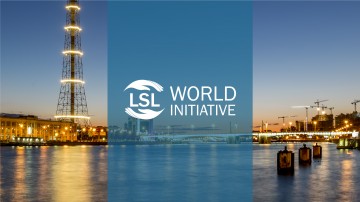LSLWI Can Assist the Government of the Philippines in Implementing an Innovative Financing Programme for Development
An Innovative Development Financing Programme in the Philippines represents an opportunity for the government to invest in healthcare, combat poverty, & create jobs.

Cape Town, December 18, 2015 (Newswire.com) - The central policy challenge facing the Philippines is how to accelerate inclusive growth—the kind that creates more and better jobs and reduces poverty. So far this has proven to be elusive, mainly because of the country’s long history of policy distortions that have slowed the growth of agriculture and manufacturing in the last six decades. A number of factors, including under-investment into key sectors, have caused the emergence of a low-productivity, low-skill services sector as the dominant feature of the economy.
More importantly, this anomalous economic growth pattern has not provided good jobs to the majority of Filipinos and has led to a substantial out-migration of many of its best and brightest people[1].
The development challenge has been summed up as follows: “The most crucial failure of Philippine development strategy lies in its employment record.[2]”
Despite its strengths, the country has so far not lived up to its potential. Opportunities to raise people’s income are limited. There are concerns about the quality of education and healthcare services, and thus about the quality of the labour force going forward.
The Philippines has made progress in meeting the Sustainable Development Goals (SDGs). It has achieved gender equality in education, reduced the mortality rate among children aged five and younger, reduced the incidence of tuberculosis cases and increased access to water and sanitation services. The country has strong potential for development because of its natural and human resources.
Nevertheless, the Philippines still ranks 117 out of 187 on the United Nations Development Programme’s Human Development Index. Progress is threatened by economic and social inequality, as well as by regional disparities[3]. Almost one in four Filipinos lives on less than US$ 1.25 a day. The economy is vulnerable because it relies heavily on remittances from millions of overseas Filipino workers.
As early as 2012, International Monetary Fund (IMF) managing director, Christine Lagarde, voiced her support for a Sin Tax Bill[4] and suggested that revenue could be raised by micro-surcharges on mobile phone services: text messaging and calls. Surveys have credited the Philippines as being the most prolific country in sending SMS messages[5]. The text/telephone coverage is in the range of 112%, which clearly satisfies one of the two criteria for “good” taxation[6].
Founded in July 2015, LSL World Initiative (LSLWI) is a leading global organisation dedicated to the socio-economic development and empowerment of emerging countries. As a private company focusing on social and economic impacts and social transformation, LSLWI works with governments to provide solutions for them to implement their own funding mechanisms to:
- achieve economic self-sufficiency
- provide direct responses for their specific developmental needs
- spur economic development
- achieve sustainable development
LSLWI works by providing emerging countries with innovative financing mechanisms[7] based on the country’s own resources. This enables them to reach their developmental goals while reducing debt and the reliance on foreign aid. The company works with multilateral institutions to find a perfect match between the country’s specific requirements, as well as the revenue streams to fund their development projects. However, to be successful, the Innovative Financing for Development process must be properly implemented through the following three phases: resource mobilisation[8], revenue assurance[9] and revenue utilisation[10].
It is a powerful approach and clearly, the proposed Filipino Sin Tax and messaging surcharge could raise considerable additional revenues for the government. Through LSLWI’s innovative financing model, the government would be able to:
- collect and protect revenues through the installation of telecommunications traffic monitoring, billing and fraud management systems and
- launch, manage and monitor the programmes effectively through the creation of a management office (MO).
Finally, an Innovative Development Financing Programme in the Philippines would represent a huge opportunity for the government to invest funds in healthcare, to combat poverty, revitalise the agricultural and manufacturing sectors, and more importantly to create the quality jobs so required by its economy.
Click here to view the website: http://www.lslwi.com
------------------------------------------------------------------------------
[1] For instance, the exodus of Filipino scientists and engineers increased from about 10,000 in 1998 to about 25,000 in 2009, according to the Philippine Overseas Employment Administration.
[2] Krugman et al. 1992
[3] Ensuring that social services reach the poor remains a major challenge. Women in the labour force are confined largely to low-wage, low-productivity jobs and have limited access to land ownership, credit and training. Natural disasters such as hurricanes and floods have resulted in severe losses of life and property and have constrained efforts to reduce poverty.
[4] The Sin Tax Reform Bill seeks to collect 40 billion pesos from additional taxes levied on alcohol and tobacco.
[5] The average mobile phone user sends 600 messages a month. Each message now costs just a peso (US$ 2.40 cents).
[6] The criteria for a “good” tax are that it should be broad-based and have a small rate.
[7] “Innovative” refers to finance mechanisms that might mobilise, govern, or distribute funds beyond traditional donor-country official development assistance (ODA)
[8] Finding new revenue streams
[9] Collecting and protecting those revenues in a transparent and efficient manner. This involves complex data collection and data processing systems. It also involves fraud management systems that prevent fraudsters from evading the new micro-surcharges or taking advantage of them through grey markets to line their own pockets.
[10] Through LSLWI’s innovative financing for development approach, governments are assisted to achieve their development goals in line with their own specific national priorities and needs.